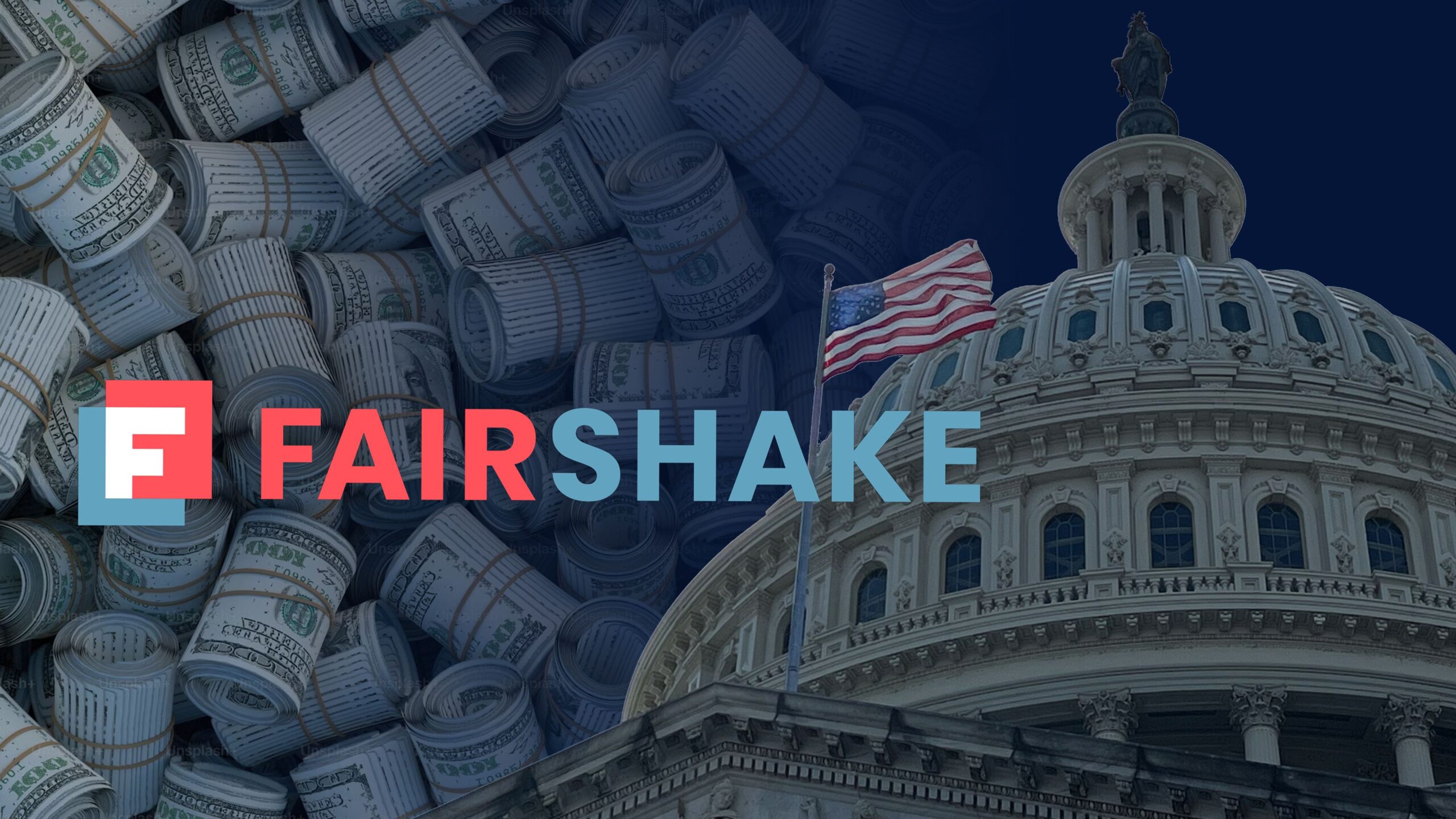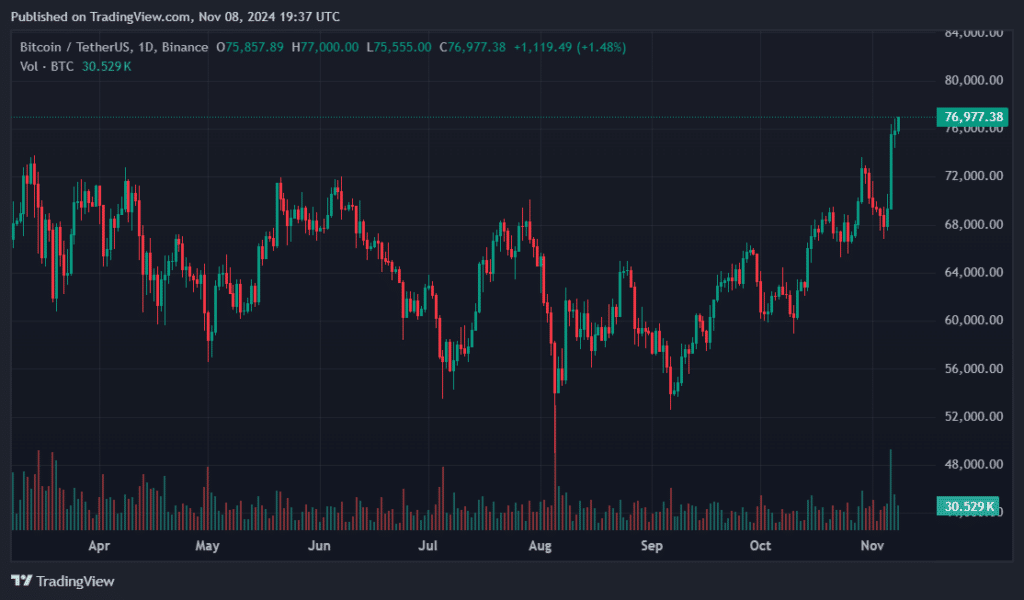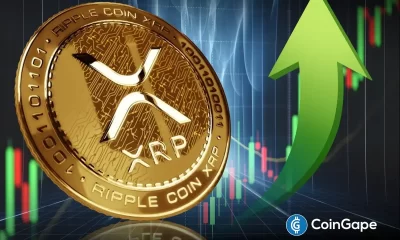Elections
I’m Grateful for Trump’s Embrace of Bitcoin
Published
5 months agoon
By
admin


Co-founder of BTC Media eleven years ago, I am passionate about the future of Bitcoin – and in the spirit of free speech and democracy on this election eve – I feel compelled to share my first Bitcoin Magazine opinion article. Weeks ago our editor-in-chief, Aaron Van Wirdum, published his Take, “Trump Does Not Give a Damn About Bitcoin,” and he invited submissions of a counter-take.
Our company was founded on the mission of hyperbitcoinization. Since the beginning, educating Main Street on Bitcoin has been core to our values. We’ve made great strides. I believe Trump – as standing president – with pro-Bitcoin advisors, could significantly fast-track Main Street’s embrace of Bitcoin, create the world’s most pro-Bitcoin economy, and commute Ross Ulbricht’s sentence… a powerful trifecta.
The resounding skepticism found in Aaron’s TAKE is not a sentiment that I share; rather, I trust in Trump’s declared support for Bitcoin. His inner circle is full of fervent Bitcoiners and those who have signaled support for Bitcoin: his children, JD Vance, Elon Musk, RFK Jr., Tulsi Gabbard, Vivek Ramaswamy, Senators Lummis, Blackburn, Hagerty and Scott plus many, many more.
As a newcomer to the Bitcoin space, Trump, like many, is still learning. I recognize and appreciate his ever-student curiosity and desire to fully grasp the future of money. A U.S. president with exposure to Bitcoin, who surrounds himself with pro-Bitcoin advisors and policies, is certainly a more favorable alternative than the openly-hostile administrations of the past and present.
In Aaron’s TAKE, Trump was chastised for failing to transact his own bitcoin purchase at a campaign stop at PubKey – a Bitcoin bar in Greenwich Village; again, there is no stone to throw here. I was elated that Trump accepted PubKey owner Thomas Pacchia’s invitation to make a campaign stop (and as I understand it, that was an invitation extended to both V.P. Harris and Trump, with only Trump accepting). The transaction was a gesture, facilitated by the community, and was a well-received and celebratory moment for that small business and for the global network of Bitcoin businesses that have struggled for this level of acceptance by politicians.
Like others, you might be questioning if donations and votes are the driving force of Trump’s interest in Bitcoin. Does it actually matter what drives any of us as we strive for a common good? We are a diverse community with diverse reasons for embracing Bitcoin — whether a desire for financial sovereignty, an investment opportunity, a sudden inability to purchase basic necessities during a protest, a distrust in the existing financial system and, yes, even politicians seeking the Bitcoin community’s support through donations and votes.
The Bitcoin Community knows Bitcoin will flourish and thrive in spite of politics; however, not all issues are apolitical. At Nashville’s Bitcoin 2024 conference (and the Libertarian National Convention), Trump stated, unequivocally, that he will free Ross Ulbricht if given the opportunity as President. The Ulbricht family needs a miracle, and it is Trump who pledges to deliver it.
I had the golden opportunity to meet Trump backstage at Bitcoin 2024 (alongside two strong, intelligent women – his granddaughter Kai and her mother Vanessa). I found Trump to be warm, humorous, and sincere. I wholeheartedly welcome Trump to Bitcoin and appreciate bipartisanship support in freeing Ross and our mission of hyperbitcoinization.
I encourage you all to vote this Tuesday, and to join Bitcoin Magazine and Stand With Crypto for The Road to Election Day, live from Las Vegas, this Tuesday, November 5, 2024, beginning at 3 p.m. PST.
Source link
You may like


Crypto Trader Says Solana Competitor Starting To Show Bullish Momentum, Updates Outlook on Bitcoin and Ethereum


weakness signals move toward lower support


Now On Sale For $70,000: The World’s First Factory Ready Open-Source Humanoid Robot


What Next for ETH as Traders Swap $86M into Solana DeFi protocols ?


Why Did Bitcoin Price (BTC) Fall on Wednesday Afternoon


Solana price is up 36% from its crypto market crash lows — Is $180 SOL the next stop?
campaign contributions
U.S. Crypto PAC Fairshake Steps Up For an Encore in Florida’s Special Elections
Published
3 months agoon
January 18, 2025By
admin

Crypto’s chief political action committee has put money on its picks for the Florida congressional seats vacated by one of President-elect Donald Trump’s closest allies, Matt Gaetz, and the politician Trump tapped as a national security advisor, Michael Waltz.
With an extremely tight majority in the House of Representatives, the replacement of the two Florida Republicans is paramount to the party’s political agenda in Congress. Crypto super PAC Fairshake — through its affiliate PAC, Defend American Jobs — has begun spending hundreds of thousands of dollars on pro-crypto names in the special elections set to fill the seats.
Gaetz was briefly President-elect Donald Trump’s pick for U.S. attorney general — the nation’s highest law enforcement official — but he resigned from consideration and from Congress as pressures mounted from a House ethics investigation into his alleged payments for drugs and sex (including a report of sexual activity with a 17-year-old).
Trump turned to embrace the state’s chief financial officer, Jimmy Patronis, as his favored candidate to fill the resulting opening in the House of Representatives. Patronis, who is outpacing a crowded field of Republican rivals in the January 28 primary, is benefiting from about $200,000 in ad spending from Fairshake, the group said.
In October, Patronis pushed for putting some state pension money into crypto investments.
The PAC also committed about $500,000 to get state Senator Randy Fine to fill Representative Waltz’s vacancy. Trump also backed Fine in an endorsement that reportedly scattered a number of potential competitors.
The candidate posted on social media site X this week that “Floridians want crypto innovation!”
Super PACs can buy ads for or against candidates, as long as they’re “independent expenditures” not approved or coordinated by the candidates. Fairshake spent $139 million to help get 53 allies into the new session of Congress, so one in ten of the sitting lawmakers benefited from crypto-funded ads.
“We are keeping our foot on the gas,” Fairshake spokesman Josh Vlasto said on Friday.
The PAC still has a towering $103 million in funds at its disposal for the next congressional election cycle, putting it far ahead for the 2026 races.
Read More: Crypto Cash Fueled 53 Members of the Next U.S. Congress
Source link
Election 2024
Coinbase CEO, Other Crypto Insiders Billions Richer After Seeking to Steer Elections
Published
4 months agoon
December 24, 2024By
adminThis is the third in a series of stories examining the crypto industry’s high-stakes 2024 foray into politics and campaigning. The first explored the electoral track record of Fairshake PAC’s strategy and the second its intense use of a 2010 Supreme Court stance.
The leaders of the companies responsible for the river of money that flooded U.S. political shores this year have already benefited tremendously from the outcome of last month’s election — increasing their personal fortunes by billions of dollars, far outpacing the large spending they devoted to crypto-friendly candidates.
Coinbase Inc. (COIN) CEO Brian Armstrong and his company devoted some $74 million to the industry’s dominant political action committee, Fairshake, putting Armstrong in a close lead over a few other crypto insiders. That’s an especially significant amount of money from a company that booked about $95 million in 2023 profits. But the elections went their way, and the company’s value has ballooned by $21 billion since Nov. 4, the day before in-person voting began and the outcome became clear.
In a pre-programmed series of trades starting less than a week after the election, Armstrong sold $100 million worth of his Coinbase shares. Those same shares on the night before the election had been worth about $39 million less. A week after that, he cashed in about $313 million — all part of a selling strategy he’d set in motion if the price spiked.
Since then, the co-founder and CEO sold smaller amounts week after week, for a total of about $437 million for stock that was worth $308 million before the victories of President-elect Donald Trump and a slate of congressional lawmakers backed by crypto. In other words, the pro-crypto sentiment surging after the election outcome that Armstrong helped shape earned him an additional $129 million in wealth for the shares he sold.
He still owns more than 10% of the largest U.S. crypto exchange, and the value of about 24 million shares tucked into his trust, according to the latest Securities and Exchange Commission filings, is about $6.4 billion — up near $2 billion since Nov. 5.
Armstrong’s stock sales were planned less than three months before the U.S. elections, submitted in a formal strategy meant to distance corporate insiders from accusations of gaming the markets. And the sales haven’t yet reached the halfway point of the SEC-disclosed intent to offload as many as 3.75 million shares, depending on the stock price meeting “certain threshold prices specified in the Armstrong Plan.”
He took to social media site X to explain the plan several days before the elections, saying he was diversifying “to make investments in moonshots” but would be keeping the “vast majority” of his shares. He said he put the price targets so high that he didn’t expect that most of it would sell in the next year “unless we do much better than expected.” COIN’s stock is currently trading around $276, up from around $186 on Nov. 4.
A Coinbase spokesperson referred CoinDesk to that post when asked for comment.
His rivals among crypto leaders who devoted similar levels of cash to the elections included Ripple Labs CEO Brad Garlinghouse and the namesake chiefs of investment firm Andreessen Horowitz (a16z). Ripple gave $73 million, and a16z put in $70 million, including large amounts held over for the next election cycle in 2026.
Garlinghouse reportedly owns more than 6% of Ripple, the company, and a large but unspecified amount of the token tied to it, XRP. Various reports put him high among the list of U.S. billionaires as a result. In the wake of the election, XRP surged to become the third-largest crypto asset by market cap.
While Garlinghouse chose not to weigh in with details on his net worth, he credited excitement over the return of Trump to the White House in a statement to CoinDesk.
“The crypto market is up over $1 trillion since Trump won — that’s the price of Gensler’s foot on the neck of the market, and he’s not even officially gone yet,” Garlinghouse said.
Since the election, Garlinghouse’s holdings of XRP have multiplied more than three times as the price of the token jumped from $0.50 to $2.32. And though the non-public Ripple Labs valuation is uncertain and was last set in the neighborhood of $11 billion earlier this year, the election has almost certainly boosted the worth of his major stake. Garlinghouse’s personal wealth has likely skyrocketed as a result.
The financial status of Mark Andreessen and Ben Horowitz is even murkier, but both men have gained dramatically since last month from their many stakes in crypto companies, likely outpacing the money they devoted to U.S. politics. But the financial figures aren’t available for a16z’s investments in private companies as they are for public Coinbase.
The firm’s vast crypto portfolio includes stakes in Coinbase, Uniswap, Solana, EigenLayer and Anchorage Digital and dozens of others. Virtually all of them became more valuable as the U.S. executive branch will be run by Trump, who says he’ll be the crypto president, and the 535-member Congress includes some 300 predicted to be supportive of digital assets — including the dozens just supported by Fairshake in their elections.
But a company spokesman declined to comment on CoinDesk’s review of the gains for Andreessen and Horowitz as individuals.
A16z’s dip into U.S. politics was aimed “to help advance clear rules of the road that will support American innovation while holding bad actors to account,” according to a post from the firm’s Chris Dixon.
Separately from Fairshake, Andreessen and Horowitz backed Trump’s election effort. And Andreessen has become an adviser to the pro-crypto president-elect as he prepares to start his second term next month.
The crypto benefactors from Coinbase, Ripple and a16z combined to make the Fairshake super PAC and its affiliates into the most powerful corporate campaign-finance effort in the 2024 elections, helping 53 members of next year’s Congress win their races. However, Fairshake didn’t weigh in on the presidential election, which may have had the largest effect on crypto market prices.
Garlinghouse, in a post-election interview on 60 Minutes, said, “I think it’s clear that Donald Trump embraced crypto and crypto embraced Donald Trump.” While he didn’t claim credit for Trump’s success, Garlinghouse said the crypto PACs “absolutely helped supercharge the candidates” and influenced outcomes in congressional contests.

His company pledged $5 million in XRP to Trump’s inauguration — the celebration next month of his return to the presidency — and Coinbase and fellow U.S. crypto exchange Kraken have also raised their hands to fund it.
During the elections, the crypto industry was accused by its critics of being remarkably transactional in its political strategy — putting money into the best places to ensure future pro-crypto votes on legislation and buying more than $130 million in congressional campaign ads with framing across the political spectrum (and without mentioning crypto). Gains for the sector have meant a boost for the three main companies behind Fairshake and for their individual leaders, who are tied to them financially.
The sector’s political effort went in “purely on interests of the specific industry,” said Rick Claypool, the research director at Public Citizen who has examined crypto’s campaign spending. “Short term, obviously this has caused a big bump in crypto.”
The return on investment for industries putting money into politics can “often be pretty good,” said Mark Hays, a senior policy analyst at Americans for Financial Reform, who has also worked on campaign finance issues. “Crypto is newer, and so the opportunity for growth is larger.”
While Armstrong and the others prefer a political narrative that features a grassroots upswell in crypto voters that shifted the elections, he and his company were directly behind establishing Stand With Crypto, the group that’s billed as a grassroots effort to harness the will of crypto voters. And Fairshake’s political influence was based almost entirely on money from Coinbase and the partner companies, plus smaller amounts from Jump Crypto and Gemini.
Gemini’s leaders, Tyler and Cameron Winklevoss, were also among Trump’s loudest fans in crypto.
The day after the voting, Cameron Winklevoss posted on X: “Imagine how much we are going to accomplish in the next 4 years now that the crypto industry won’t be hemorrhaging $ billions on legal fees fighting the SEC and instead investing this money into building the future of money. Amazing awaits.”
On Nov. 11, the day Armstrong began selling large amounts of Coinbase stock, Tyler Winklevoss posted, “The shackles are off, 100k incoming.” Bitcoin hit that mark a month after the election.
Source link

Bitcoin crossed $77,000 on Friday, Nov. 8, setting a new all-time high for the second consecutive day.
Bitcoin (BTC) reached a new all time high of $77,020 roughly 48 hours after Donald Trump won the U.S. presidential election, along with the election of several pro-crypto policymakers to Congress. With a market cap of $1.5 trillion, Bitcoin now ranks as the world’s ninth most valuable asset, surpassing Mark Zuckerberg’s Meta.
BTC’s year-to-date growth has exceeded 118% with this recent surge. Over the past 30 days, Bitcoin has increased by nearly 25% as seasonal trends and halving-year data indicated bullish prospects. During the last two election cycles, Bitcoin has reached new highs and has not returned to pre-election levels.

Policy plans
For the first time, crypto money played a significant role in funding political action committees, leading experts and opinion leaders to anticipate progressive digital asset regulations from Washington. A BTC bill from Wyoming Senator Cynthia Lummis appears to be a frontrunner in what could become a new crypto policy landscape.
Like President-elect Donald Trump, Sen. Lummis pushed for a strategic national Bitcoin reserve and more. The proposal from Lummis would implement a BTC buying plan, piling on America’s existing 203,000 Bitcoin stockpile.
Lummis suggested acquiring 1,000,000 BTC over five years, which would cost the U.S. an estimated $77 billion if Bitcoin’s price remained constant over that period.
Bitcoin price
BTC ambassadors like Michael Saylor and the larger crypto community predict prices are going higher. Targets of $100,000 by year’s end, and $200,000 by 2025 have mentioned by investors and experts alike.
Investors already splurged $72 billion buying into Bitcoin via Wall Street exchange-traded funds. State like Detroit and Wyoming have announced some form of Bitcoin adoption. Marshalled interests between crypto titans did not disband following victory in the 2024 U.S. elections.
Crypto-focused super PAC Fairshake has raised over $78 million for the 2026 mid-terms. The organization disclosed donations from A16z crypto and Coinbase even before the Associated Press declared voting results.
I think @standwithcrypto did amazing work this election cycle to rate political candidates on crypto issues and apply pressure.
There’s still more work to do.
The largest cohort of U.S. politicians is still ranked undecided. pic.twitter.com/EuARsSAZs3
— RYAN SΞAN ADAMS – rsa.eth
(@RyanSAdams) November 7, 2024
Source link

Crypto Trader Says Solana Competitor Starting To Show Bullish Momentum, Updates Outlook on Bitcoin and Ethereum

weakness signals move toward lower support

Now On Sale For $70,000: The World’s First Factory Ready Open-Source Humanoid Robot

What Next for ETH as Traders Swap $86M into Solana DeFi protocols ?

Why Did Bitcoin Price (BTC) Fall on Wednesday Afternoon

Solana price is up 36% from its crypto market crash lows — Is $180 SOL the next stop?

Solana Retests Bearish Breakout Zone – $65 Target Still In Play?

How Expanding Global Liquidity Could Drive Bitcoin Price To New All-Time Highs

Apple Delists 14 Crypto Apps in South Korea Including KuCoin and MEXC Exchanges Amid Regulatory Crackdown

Athens Exchange Group eyes first onchain order book via Sui

Futureverse Acquires Candy Digital, Taps DC Comics and Netflix IP to Boost Metaverse Strategy
Court Grants Ripple And SEC’s Joint Motion To Suspend Appeal

AVAX Falls 2.1% as Nearly All Assets Trade Lower

What is a VTuber, and how do you become one in 2025?

Top Expert’s Update Sets $10 Target

Arthur Hayes, Murad’s Prediction For Meme Coins, AI & DeFi Coins For 2025

Expert Sees Bitcoin Dipping To $50K While Bullish Signs Persist

Aptos Leverages Chainlink To Enhance Scalability and Data Access

Bitcoin Could Rally to $80,000 on the Eve of US Elections

Crypto’s Big Trump Gamble Is Risky

Institutional Investors Go All In on Crypto as 57% Plan to Boost Allocations as Bull Run Heats Up, Sygnum Survey Reveals

Sonic Now ‘Golden Standard’ of Layer-2s After Scaling Transactions to 16,000+ per Second, Says Andre Cronje

3 Voting Polls Show Why Ripple’s XRP Price Could Hit $10 Soon

Ripple-SEC Case Ends, But These 3 Rivals Could Jump 500x

Has The Bitcoin Price Already Peaked?

The Future of Bitcoin: Scaling, Institutional Adoption, and Strategic Reserves with Rich Rines

A16z-backed Espresso announces mainnet launch of core product

Xmas Altcoin Rally Insights by BNM Agent I

Blockchain groups challenge new broker reporting rule

I’m Grateful for Trump’s Embrace of Bitcoin
Trending

 24/7 Cryptocurrency News5 months ago
24/7 Cryptocurrency News5 months agoArthur Hayes, Murad’s Prediction For Meme Coins, AI & DeFi Coins For 2025

 Bitcoin3 months ago
Bitcoin3 months agoExpert Sees Bitcoin Dipping To $50K While Bullish Signs Persist

 24/7 Cryptocurrency News3 months ago
24/7 Cryptocurrency News3 months agoAptos Leverages Chainlink To Enhance Scalability and Data Access

 Bitcoin5 months ago
Bitcoin5 months agoBitcoin Could Rally to $80,000 on the Eve of US Elections

 Opinion5 months ago
Opinion5 months agoCrypto’s Big Trump Gamble Is Risky

 Bitcoin5 months ago
Bitcoin5 months agoInstitutional Investors Go All In on Crypto as 57% Plan to Boost Allocations as Bull Run Heats Up, Sygnum Survey Reveals

 Altcoins3 months ago
Altcoins3 months agoSonic Now ‘Golden Standard’ of Layer-2s After Scaling Transactions to 16,000+ per Second, Says Andre Cronje

 Ripple Price4 weeks ago
Ripple Price4 weeks ago3 Voting Polls Show Why Ripple’s XRP Price Could Hit $10 Soon


